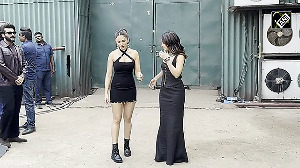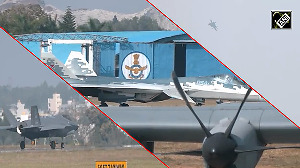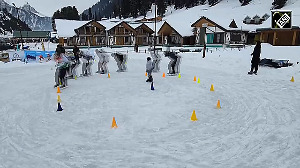
I usually do not write for this section, but circumstances sometimes force upon you a new type of experience. In my case, it was unexpected: on October 14, a Friday, I had a heart attack.
Till that fateful morning I had enjoyed good health. In fact, I had not taken any medicine for the past two decades; I just had not needed them.
I have the good luck to live in peaceful surroundings, far from polluted and noisy cities and my life is relatively simple. When I visit Delhi I am always disturbed by the eating and sleeping habits of people. I have always liked to sleep early and wake up early. In the capital, most people start to dine after 10 pm, usually after a few drinks. I could never get used to this lifestyle.
It is perhaps a grace that I had these 'natural' habits. I regularly played football on Sunday, though the doctors now tell me that it is not enough to exercise the body just once a week; a daily walk or yoga exercises or any other form of physical activity is highly advisable.
Though I was in good health, for some days before the myocardial infarction, I complained of pain in the stomach. I thought it was probably a sort of amoebiosis, quite common in the rural areas in the South.
The night before the attack, the pain shifted to the higher abdomen. I did not bother much about it, though I could not sleep.
Lifestyle tips to prevent cancer, heart disease
The next morning I did not wake up feeling great, but I worked at home as usual for one-and-a-half hours on my computer, completing a chapter of my next book. Later, I climbed on my motorbike and went to the office, a 10-minute drive.
A few minutes after reaching the office, I had an acute pain in the chest accompanied by cold sweat and nausea. It lasted several minutes. By that time, my wife had the time to contact a doctor who advised her to take me immediately to the local health centre 5 km away. Having no other vehicle than a motorbike at our immediate disposal, I sat behind my wife who drove to the dispensary.
The drive was quite unpleasant. It seemed to last forever.
At the health centre, a doctor was waiting for me. My blood pressure was taken: It was abnormally high. The doctor decided I must go immediately to a specialised establishment in Pondicherry to get an electro-cardiogram taken. All this time, I still thought the amoebae were playing havoc.
Half an hour later, I walked into the Pondicherry clinic, where an ECG was done. I still thought that it was only a routine check.
Got a 40-inch waistline? Beware!
I waited a few moments in the director's office and when he entered the room, we started discussing our favourite topic, the history of Pondicherry. However, when he looked at the ECG, his face changed.
'You are a very lucky person to have reached here,' he told me. 'You just had a myocardial infarction. I must admit you immediately in the Intensive Care Unit.'
He did not even want me to walk to the ICU. I was immediately put under a drip and administrated drugs to thin the blood and even given oxygen.
I was still not convinced that it was not simply my amoebae creating all this fuss, but at that point in time, there was no choice but to listen to the doctors. Retrospectively, I feel this was a grace: I never thought for one second about a heart attack. I would have probably panicked and things could have been much worse.
During next days, I felt better: I chatted away with all my visitors, trying to convince them that nothing had happened and that the jumps in the ECG were probably due to electricity spikes. Everyone knows how bad the fluctuations are in the supply of current by the electricity board. That was my theory!
15 minutes of laughter makes a good heart
Unfortunately, on the third day, I had a second -- though milder -- attack. I could no longer brag. This time, the doctors admitted the problem had not been controlled with the drugs. It was decided to shift me immediately by ambulance to Chennai to a cardiac hospital -- the Institute of Cardio-Vascular Diseases of the Madras Medical Mission, where an angiogram could be performed and corrective measures -- angioplasty or surgery -- could be taken.
I reached Chennai at night and the next day the angiogram revealed major, multiple arterial blockages. Two arteries were 90 per cent blocked, one 60 per cent and one 50 per cent. No chance to escape surgery.
The surgeon first thought of waiting a week for my condition to stabilise to operate. However, the next day I had another small unease. The cardiologists and the surgeon decided to go in for an emergency quadruple bypass surgery immediately. It was done on Wednesday, October 19.
The six-and-a-half hour operation was successful and at 10 pm, I was shifted to the post-operation ICU. I woke up the next morning at around 8:30 am: I was no longer an independent human being!
I discovered myself lying on a bed with pipes coming out of my stomach, chest, limbs, neck, mouth and nose. I thought to myself that I must look like a porcupine with all the pipes poking out of my body.
I was constantly monitored by doctors and nurses. In this position, you cannot eat, you cannot really speak. But you can turn your head to the right or the left; and there I discovered two other human beings in a similar position, having gone through the same ordeals.
The many healthy benefits of fish!
After this close shave -- Lord Yama, the lord of death, decided not to claim me immediately -- and a three-day stay in the ICU, I had time to ponder over the concept of brotherhood. Perhaps 'ponder' is not quite the exact word, for I lived it through my body.
In all my life, I have never experienced such an overwhelming sense of fraternity. On my one side was a brother from Tanzania, and on the other a Tamil Brahmin. But for bodies lying in these conditions, colour of skin, race, religion or caste do not really exist anymore. You are just one human body and there lie your brothers -- dismantled of labels.
During my stay, something greatly touched me. It was the good humour, the kindness and enthusiasm of the doctors and nurses. They were always sweet and encouraging. I particularly remember one young intern (I presume that he was an intern, though I did not think of asking him at that time).
His name was Anand. He would often pass in front of my bed and each time make a thumbs-up gesture. It was just after the operation, I was in the special ICU and I was not really comfortable with all my pipes. However, each time Anand would pass in front of my bed, my morale would go higher and after a few times, I started responding with a thumbs-up of my own.
It was as if we were playing in the NBA championship and I had scored a great basket. I realised later that keeping one's morale high is the secret for a quick recovery. I do not know if the doctors and the staff are trained to keep the spirits of their patients high, but it is the most efficient and caring approach.
What are your chances of getting a heart attack?
For the first five days, Anand would remove a pipe a day from my body. He would come in the morning, ask me to take a deep breath, pull out the pipe and then flash the thumbs-up. I would thumbs-up in response. Apart from the first pipe removal -- which was very painful because some mucus had to be pumped out from the lungs -- the remaining removals were pure ananda. I was slowly becoming an independent entity again.
I must say the doctors and particularly my surgeon were daily pushing me to progress. 'Don't stay in bed, go for a walk; you should have a normal life as soon as possible' was their motto. Though I was prescribed three months rest (without any tension or stress), I was asked to exercise every day without fail.
Another strong experience of my 12-day stay in the ICVD is what I call the 'Survivor's Club'. Three or four days after the operation, each patient is invited to join the physiotherapy session on the second floor of the eight-storey building, at 10 am and 3 pm.
I named it the 'Survivor's Club' because all human beings attending the exercises have had very narrow escapes. Each one could easily have been on the other side -- without a lot of luck, the knowledge of the cardiologists, the skills of the surgeons and the ultra modern equipment of the ICVD.
Every morning and afternoon, some 30 'survivors' assemble for 30 minutes of exercise. Here again, the feeling of solidarity and brotherhood is spontaneous. Amongst the 'survivors' were people from different backgrounds and nationalities.
There were several Africans along with North and South Indians and even a white-skinned French man. Ladies and gents both participated in the rehabilitation programme. But the most touching perhaps were the children who had been operated on for genetic cardiac malformations or other cardio-vascular infant diseases.
They were generally accompanied by their mothers who tried to show them the exercises: the toddler very sweetly trying to imitate their mother or neighbour. Once again I realised that all man-made differentiations are totally superficial.
Unfortunately, it needs such an experience to realise the profound unity of mankind in its diversity.
This was indeed an interesting experience. I learned a few lessons.
First, what my Tibetan friends call 'the Precious Human Body' is really precious and one should take care of it.
Second, when it is not really necessary, one should not be stressed.
I always like to quote Shantideva: If it can be remedied, there is no need to be unhappy. If it can't be remedied, what is the use of being unhappy?
Now, the time has come to practise it.
Image: Uttam Ghosh






 © 2025
© 2025